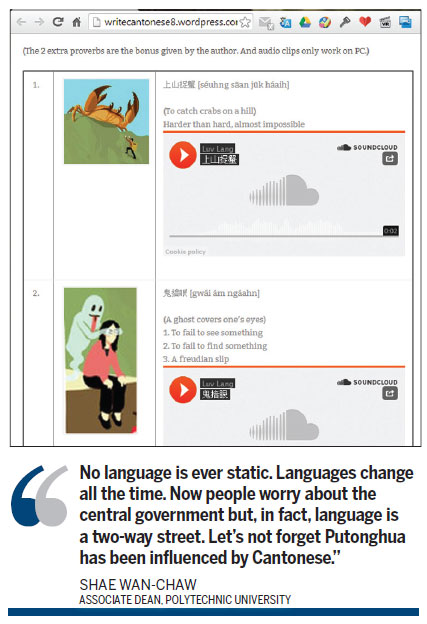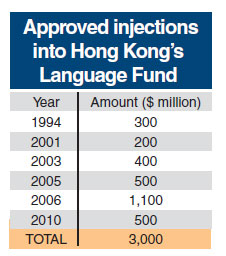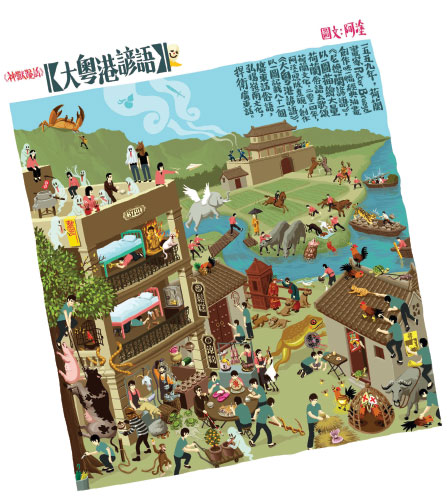The redoubtable Cantonese
Updated: 2014-03-14 07:26
By Timothy Chui(HK Edition)
|
|||||||||
|
Graphic artist and part-time cartoonist Ah To has found overnight fame with his "The Great Canton and Hong Kong Proverbs", a collection of 81 uniquely Cantonese idioms woven into an almost chaotic cartoon scene. |


Cantonese remains unchallenged as the language of Hong Kong's day-to-day intercourse. Yet many believe something needs to be done to prevent the local dialect from being lost under the rising influence of Putonghua. Timothy Chui reports.
In his phenomenally popular illustration, "The Great Canton and Hong Kong Proverbs" artist and cartoonist Ah To depicts two men raising a draw bridge while a third man is crossing it. It is an illustration of a familiar Cantonese idiom: pulling out the planks while crossing the bridge, or saving one's skin.
Comically woven into the cartoon-like scene, alive with all manner of men, beasts and ethereal entities, busily attending to their work, burdens or mischief, are 80 more Cantonese idioms.
An out of sorts Buddha statue fumes on a second floor balcony - reminding the viewer that sometimes life's frustrations may rise beyond the tolerance of even the most placid disposition.
"The Great Canton and Hong Kong Proverbs" has become an Internet hit. Ah To, the part-time cartoonist, is coping with new-found fame and scrambling to reply to the torrent of emails flooding his Facebook inbox.
The illustration was inspired by the Sixteenth Century oil on oak panel painting "Netherlandish Proverbs" by Flemish master Pieter Bruegal the Elder.
Some of Ah To's idioms have ready analogues in English. There's a sow scaling a tree, reminding us of the English sentiment concerning that which is so improbable, it is likely to occur only "when pigs can fly". A goose monger dousing a group of fowl with a bucket of water exemplifies what can be as easy as "water off a duck's back".
Lyrical richness
What may be difficult for most Westerners is the significance of the telephone in a cauldron of bubbling congee located behind a man selling fish. All of us, however, are familiar with those who chatter on for hours on the phone. The image of winter melon beside some tofu waiting to be prepared will be lost on most Westerners. The image is significant of a fatal event, or a crisis, at least.
There are ghosts - which always make for a ripping tale. A salesman gives a ghost a thumbs up while handing the apparition a plate of bean curd. The improbability of the situation heavily accents a speaker's expression of disbelief.
To has always been fascinated with the lyrical richness of Cantonese. It's his second language. He was raised on the language of his father, Teochow.
The work which has drawn a large following among overseas Chinese was inspired, in part, by Ah To's concern about the future of the Cantonese language.
"I think many people in Hong Kong don't realize that Cantonese is at risk. Of course, you hear people speaking Cantonese everywhere in Hong Kong. But when you look at what's happening in the schools - some already are teaching classes in Mandarin, and lots of parents want their kids to learn Mandarin to prepare them for the future. But we should not underestimate what this shift means," he told China Daily.
The issue over traditional and simplified Chinese has been contentious over the decades since its introduction to raise domestic literacy rates. Through the generations it has become the lingua franca of the mainland. Yet, Chengdu-born novelist Li Yaotang, also known by his pen name Ba Jin, wrote in 1983 the ability to communicate easily with people from Hong Kong, Taiwan and with overseas Chinese, as well as those from the Chinese cultural sphere including Japan and Vietnam should not be undone by too much simplification.
Balancing the need to improve skills in speaking and writing Mandarin while maintaining the vitality of Cantonese is a hot topic. The adoption of Mandarin Chinese as the language of instruction and the teaching of simplified Chinese text in some Hong Kong schools adds fuel to the ongoing controversy.
If Cantonese is bound to be relegated to the status of a minor local dialect, there'll be plenty of local resistance. Among three local languages, Cantonese remains indisputably the language of day-to-day commerce and social interaction, in preference to Mandarin, or English.
Research published in 2012 by the University of Hong Kong linguistics doctorate Lee Kwai-sang and Leung Wai-mun for the Hong Kong Institute of Education's Department of Chinese found Cantonese to be the overwhelming preference in and out of the work place. More than 15 years after the handover, Cantonese remains the first language of 89.2 percent of the population.
Cantonese is afforded unique, geographical protection in Hong Kong and Macao. In Hong Kong, that protection is ensconced in the Basic Law. While Cantonese may be spoken day to day in large swaths of southern China and among the far-flung diaspora extending around the globe, only in the Special Administrative Regions does it hold official status.
Threat overblown
No other Chinese dialect, including Hakka, Teochew or Shanghainese, ever was afforded the same protection. Polytechnic University Associate Dean Shae Wan-chaw believes Hong Kong will remain a bastion of Cantonese and that the threat of a sudden inundation of Putonghua is overblown.
"Size does matter, but so does vibrancy. Hong Kong was fortunate enough to have a lot more international exposure. With more exposure, it is more well known. Therefore, Hong Kong Cantonese has become more vibrant than the original Cantonese," he said.
Hong Kong is home to a huge entertainment industry. The film market on the mainland is attractive, but Hong Kong films will be able to retain their original Cantonese dialogue as long as there are subtitles in simplified Mandarin The change, which is to take effect next year, emerges from the latest round of agreements under the Closer Economic Partnership Arrangement.
Shae cites Stephen Chow, long derided by Cantonese cultural snobs for his low-brow 1990's comedy movies, for his contribution in stirring interest among second-generation emigrates to renew their Cantonese language heritage.
He said Canto-pop, though long passed its golden years, continues to foster links with immigrant populations which find it easier to stay connected to Hong Kong in a globalized world.
Trends have changed since Canto-pop was the dominant force in Chinese pop culture. Mando-pop and Korean-pop have displaced Cantonese-based music at the top of the charts, according to University of Hong Kong Professor Stephen Chu Yiu-wai.
Trendy culture
"Cantonese's ultimate survival lies in keeping Hong Kong culture trendy in the eyes of the next generation. Its longevity depends on good media," he said, with a nod to Ah To's cartoon collage of Cantonese common phrases.
China's constitution provides specific protections for local dialects, without bestowing official language status. Successive waves of migration into Guangdong have not changed the day-to-day reality - Cantonese still is heard in the province's schools informal interaction among students, Shae said.
"Because language is a common life experience and that tends to be more localized despite influence of television and other kinds of globalizing forces. Local communities do retain idiosyncratic features in the way they use language," Shae said.
"Language is a funny thing. No matter how you want to standardize it, you can't. English is an international language, but it varies between accents from England, Australia and the United States. Even within Britain, you have a wide range of accents which can seem mutually unintelligible.
"No language is ever static. Languages change all the time. Now people worry about the central government but, in fact, language is a two-way street. Let's not forget Putonghua has been influenced by Cantonese. In the past, people who spoke Putonghua wouldn't call for the "bill" as they do in Cantonese but now its quite common. Even words like sofa and taxi are loan words which have become common place," he said.
Contact the writer at timothy@chinadailyhk.com
(HK Edition 03/14/2014 page3)
